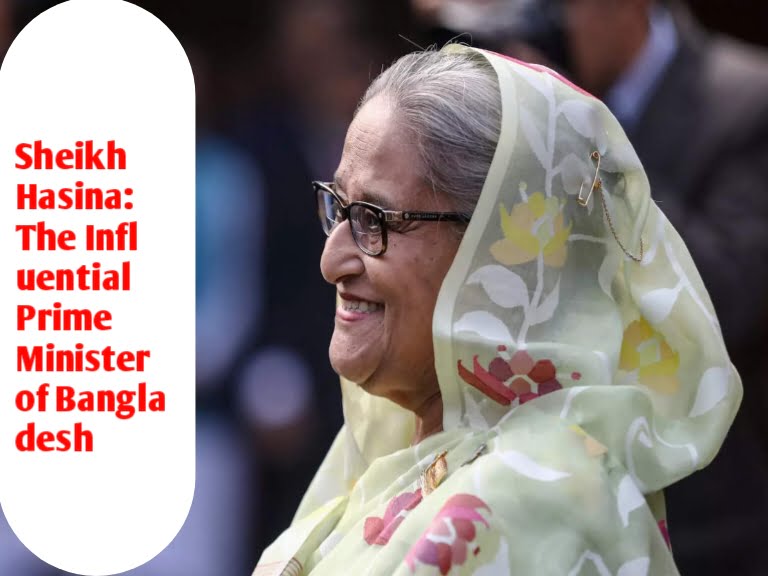Sheikh Hasina: The Influential Prime Minister of Bangladesh
Sheikh Hasina, the current Prime Minister of Bangladesh, has been a pivotal figure in the country’s politics for decades. Her leadership, marked by significant economic growth, social progress, and political challenges, has shaped modern Bangladesh. This article delves into her early life, political career, major achievements, and impact on the nation.
Early Life and Background
Sheikh Hasina Wazed was born on September 28, 1947, in Tungipara, a small village in the Gopalganj District of Bangladesh. She is the eldest daughter of Sheikh Mujibur Rahman, the founding father and the first President of Bangladesh, and Sheikh Fazilatunnesa Mujib. Growing up in a politically active family, Hasina was exposed to the struggles for Bangladesh’s independence from an early age.
She completed her schooling in Dhaka and went on to study at the University of Dhaka, where she became involved in student politics. Hasina’s early life was marked by the turbulence of the 1971 Bangladesh Liberation War, during which her family played a crucial role.
Political Career
Reed more… Divya Seth: A Versatile Talent in Indian Television and Film
Sheikh Hasina’s entry into politics was significantly influenced by the assassination of her father, Sheikh Mujibur Rahman, and most of her family members in 1975. She and her sister, Sheikh Rehana, were abroad at the time and thus survived. This tragedy compelled her to take up the mantle of her father’s political legacy.
Return to Bangladesh and Political Ascent
Hasina returned to Bangladesh in 1981 and was elected as the President of the Awami League, one of the major political parties in the country. Her leadership was characterized by a strong commitment to democracy, secularism, and social justice.
First Term as Prime Minister (1996-2001)
Sheikh Hasina became the Prime Minister of Bangladesh for the first time in 1996 after the Awami League won the general elections. Her first term saw several important developments:
- Economic Reforms: Initiatives to liberalize the economy and encourage private sector growth.
- Peace Accord: Signing of the Chittagong Hill Tracts Peace Accord in 1997, ending decades of insurgency.
- Social Programs: Implementation of programs to improve healthcare, education, and women’s rights.
Opposition Years and Political Challenges
Between 2001 and 2008, Hasina faced numerous political challenges, including periods of imprisonment and political violence. Despite these hurdles, she continued to be a prominent opposition leader, advocating for fair elections and democratic governance.
Second Term and Beyond (2009-Present)
Sheikh Hasina returned to power in 2009 and has since been re-elected multiple times. Her subsequent terms have been marked by:
- Economic Growth: Under her leadership, Bangladesh has seen impressive economic growth, becoming one of the fastest-growing economies in the world.
- Infrastructure Development: Major projects such as the Padma Bridge and improvements in power supply and transportation networks.
- Digital Bangladesh: Promotion of technology and digital infrastructure to transform the country into a middle-income nation.
- Social Welfare: Expansion of social safety nets, healthcare improvements, and educational reforms.
Major Achievements
- Economic Progress: Bangladesh’s GDP has grown significantly, and the country is on track to graduate from the United Nations’ Least Developed Countries list.
- Women’s Empowerment: Initiatives to promote gender equality and empower women in various sectors, including politics, education, and the workforce.
- Environmental Initiatives: Efforts to address climate change and environmental sustainability, critical for a country highly vulnerable to climate impacts.
Controversies and Criticisms
Despite her achievements, Sheikh Hasina’s tenure has not been without controversy. Criticisms include allegations of human rights abuses, restrictions on freedom of speech, and political repression. The government has been accused of suppressing opposition and controlling the media, leading to concerns about democratic backsliding.
Legacy and Impact
Sheikh Hasina’s impact on Bangladesh is profound. Her leadership has transformed the country’s economic and social landscape, making significant strides in poverty reduction, healthcare, and education. However, her tenure also raises important questions about governance, democracy, and human rights.
Conclusion
Sheikh Hasina remains a towering figure in Bangladeshi politics, with a legacy marked by both remarkable achievements and significant controversies. Her vision and policies have played a crucial role in shaping contemporary Bangladesh, positioning it as a developing nation with a bright future. As she continues to lead, her influence on the country’s trajectory will be closely watched by both supporters and critics alike.
How did you like the information given in our article today, please tell us in the comment section and for more such posts, follow our page The News House, thank you


